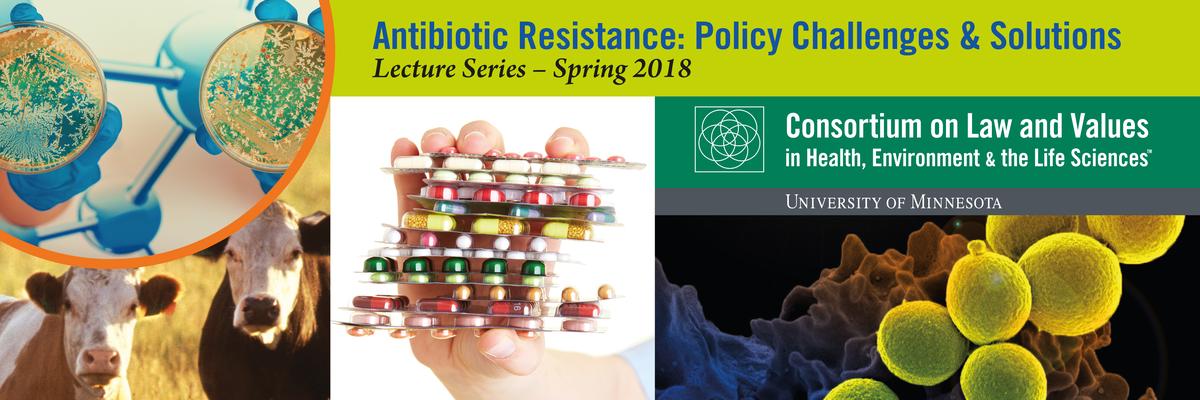
Wednesday, February 7, 2018 - 11:30am to 1:00pm
Mississippi Room, Coffman Union
To view Prof. Blaser's slides, click here.
Although antibiotics are probably as old as life itself, over the last 75 years we have been using antibiotics and related antibacterials on a worldwide scale approaching and possibly exceeding one million tons a year. Such use – in the clinic, the farm, the ranch, fisheries, and the home – is having an enormous impact on our ecosystems. One manifestation of the ecological consequences has been the progressive rise in antibiotic resistance, which is increasing geometrically in both scale and diversity. Another manifestation has been the damage to our internal ecosystems, most importantly the human microbiome. We are beginning to learn of the consequences in terms of disease, including those that have been epidemic during this time period – obesity, asthma, diabetes, inflammatory bowel disease, among others. We need to recognize and interdict these issues which often begin in early life, because unless we do, the problems will predictably grow. Prof. Blaser described his research and potential solutions that are yet to be developed.
Resources:
- Missing Microbes: How the Overuse of Antibiotics is Fueling our Modern Plagues, Martin J. Blaser (New York: Henry Holt, 2014)
- Review: "Drugs: Gut Response," Maryn McKenna, Nature (April 10, 2014)
- Review: "Antibiotics and Collateral Damage," Alison E. Mather, Science Magazine (May 2, 2014)
- Review: "Bacteria Make Us Human," Mohsin Ali, The Lancet (May 2, 2015)
- Interview: "Modern Medicine May Not be Doing your Microbiome any Favors," Terry Gross, Fresh Air (April 14, 2014)
- Comment: The Theory of Disappearing Microbiota and the Epidemics of Chronic Diseases, Martin J. Blaser, Nature (July 27, 2017)
- Report: Combating Antimicrobial Resistance: A One Health Approach to a Global Threat, National Academies of Sciences, Engineering and Medicine (Dec. 8, 2017)
- The Antimicrobial Stewardship Project of CIDRAP (the Center for Infectious Disease Research and Policy), a Consortium member, is a comprehensive repository of accurate, current reporting on this and related topics. Visit their website here.
Provided by the Consortium on Law and Values in Health, Environment & the Life Sciences in collaboration with the Center for Infectious Disease Research and Policy (CIDRAP) and Microbiota Therapeutics Program
Commentator:
James R. Johnson, MD
Professor of Medicine
Senior Associate Director of the Infectious Diseases Fellowship Program
University of Minnesota
Senior Associate Director of Molecular Epidemiology Unit
Minnesota VA Medical Center
Moderator:
Michael J. Sadowsky, PhD
Director, BioTechnology Institute
Professor, Department of Soil, Water and Climate
University of Minnesota
Continuing Education Credit
Accreditation Statement
In support of improving patient care, University of Minnesota, Interprofessional Continuing Education is jointly accredited by the Accreditation Council for Continuing Medical Education (ACCME), the Accreditation Council for Pharmacy Education (ACPE), and the American Nurses Credentialing Center (ANCC) to provide continuing education for the healthcare team.
Credit Designation Statements
American Medical Association (AMA)
The University of Minnesota, Interprofessional Continuing Education designated this live activity for a maximum of 1.5 AMA PRA Category 1 Credits™.
Veterinarians: The Minnesota Board of Veterinary Medicine approved this activity for continuing education credits.
Attorneys: The Minnesota State Board of Continuing Legal Education approved 1.5 Continuing Legal Education (CLE) credits; Event Code is #250238.

Martin J. Blaser, MD, is the Singer Professor of Translational Medicine, Professor of Microbiology, and directs the Human Microbiome Program at the NYU School of Medicine. He served as Department of Medicine chair from 2000-2012. A physician and microbiologist, Prof. Blaser studies our persistently colonizing bacteria. His work focused on Campylobacter species and Helicobacter pylori, model systems for studying the interactions of residential bacteria with their hosts. He also has been examining the human microbiome in health and in diseases such as asthma, obesity, diabetes, and allergies. Prof. Blaser has served as President of the Infectious Diseases Society of America; Chair of the Board of Scientific Counselors of the National Cancer Institute; and Chair of the NIH Advisory Board for Clinical Research, and now Chairs the President’s Advisory Council for Combatting Antibiotic Resistant Bacteria (PACCARB). He is an elected member of the National Academy of Medicine and the American Academy for Arts and Sciences. He holds 28 U.S. patents, has authored more than 550 original articles, and wrote the widely acclaimed book, Missing Microbes.